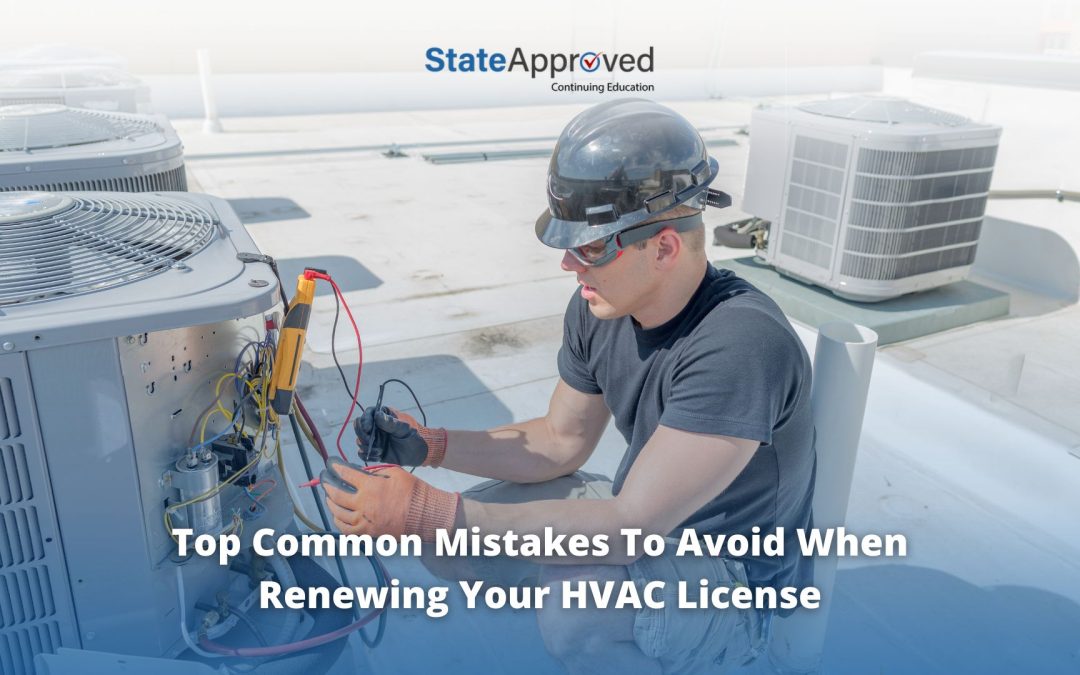Renewing your HVAC license is essential but can be tricky. To help you, this guide covers the common mistakes to avoid when renewing your HVAC license, ensuring you avoid delays and keep your business running smoothly.
Key Takeaways
- Timely renewal of HVAC licenses is essential to avoid penalties and work stoppages; marking deadlines and setting reminders can help ensure compliance.
- Submitting complete, accurate applications with all necessary documentation, including proof of continuing education and insurance, is critical for a smooth renewal process.
- Understanding state regulations and verifying license expiration dates can help contractors avoid common pitfalls that lead to license lapses and legal issues.
Missing or Mismanaging the Renewal Deadline
Failing to meet the renewal deadline can result in significant consequences, including fines, loss of licensure, and potential halts in business activities until the license is restored. It’s imperative for businesses to renew their licenses on time to maintain legal operations.
Imagine being in the middle of a critical job only to find out your license has expired. This doesn’t just raise compliance issues—it can damage client trust and your reputation. To avoid this, make it a point to routinely verify your license expiration date and prominently mark deadlines in your business management system.
Contractors should consult their state’s licensing board website or check the physical or digital license card to confirm expiration dates. Missing a renewal by even a few days can result in late fees or a complete lapse in licensure. In some states, licenses that remain expired beyond a certain period may require reapplication from scratch. Being proactive helps avoid costly delays and disruptions.
Read more: What to Do If You Miss Your HVAC License Renewal Deadline: A Complete Guide
Incomplete Applications
Submitting an incomplete renewal application can significantly slow down the process, causing delays that may impact your ability to work legally. For a seamless experience, ensure the application is complete and accurate before submission.
All required supporting documents—such as proof of continuing education, valid identification, and other state-mandated forms—should be included. Organizing this information in advance using digital business tools or a centralized filing system can ensure nothing is overlooked during submission.
An incomplete application may trigger follow-up requests from the licensing board, extending the processing time. This can lead to unnecessary downtime and potential revenue loss. To avoid setbacks, professionals often rely on administrative support or dedicated licensing coordinators to ensure everything is submitted correctly the first time.
Ignoring Continuing Education Requirements
Meeting continuing education (CE) requirements is a non-negotiable part of renewing an HVAC license. Contractors must complete a designated number of CE hours before their license expires. These courses typically include both industry core topics and safety or business practices, ensuring professionals stay up to date.
The number and type of CE hours vary by state. For instance, some jurisdictions may require a mix of technical and business-related training. Contractors who fail to meet these education requirements risk delays in their renewal and potential legal repercussions for operating without a valid license.
Rather than managing CE hours on their own, many professionals opt for state-approved education providers that offer structured, compliant coursework with automatic reporting to state boards. This eliminates guesswork and reduces the risk of missing critical requirements.
Failing to Pay Renewal Fees or Submit Documentation on Time
Timely payment of renewal fees and submission of all required documentation is essential to maintain an active license. Failure to do so can result in the expiration or suspension of your license, late penalties, or forced work stoppages.
Some states impose specific deadlines based on the year or license type. For example, in certain jurisdictions, contractors must submit all fees and paperwork by a specific date during odd-numbered years to remain in good standing. Missing that deadline not only incurs late fees but may also require reapplying or paying reinstatement costs.
Read more: Navigating HVAC License Renewal in Texas: A Simple Guide
To avoid these issues, many HVAC professionals delegate license tracking and payment coordination to internal compliance teams or service providers that specialize in regulatory paperwork. This ensures that documentation is reviewed, fees are submitted in advance, and every aspect of the renewal process is managed professionally and on time.
Read more: HVAC License Renewal vs Reinstatement: Key Differences Explained
Submitting Incorrect Information
Accuracy is vital when submitting your renewal application. Errors—whether in your business address, insurance details, or license number—can delay processing or result in rejection.
Instead of relying solely on manual review, contractors often utilize specialized licensing software or third-party services that double-check entries and upload documentation to ensure accuracy. This professional approach minimizes human error and keeps the process moving without delay.
Before final submission, it’s important to verify that all contact information, employment details, and continuing education credits are correctly entered. A thorough check can prevent unnecessary hold-ups and avoid complications with state licensing boards.
Overlooking Insurance Requirements
Keeping your insurance up to date is a crucial part of license renewal. Most states require proof of active general liability and, when applicable, workers’ compensation insurance during the renewal process.
For instance, in some jurisdictions, contractors must provide documentation showing minimum coverage limits to meet regulatory standards. These certificates must often list the state’s licensing authority as the certificate holder. Professionals who manage large projects or have teams in the field typically partner with insurance agents experienced in contractor licensing requirements. These agents ensure documentation is tailored specifically for regulatory approval.
Submitting outdated or incomplete insurance certificates can stall the renewal process. A professional approach involves routine insurance audits and communication between insurers and licensing support personnel to keep your records accurate and compliant.
Read more: Learn About the Different Types of HVAC Certifications
Neglecting to Provide Proof of Financial Stability
Some states require contractors to show proof of financial responsibility, which may include CPA-reviewed financial statements or personal credit reports. This demonstrates your ability to operate responsibly and meet business obligations.
When required, contractors often turn to certified accounting firms to prepare these documents to meet state standards. In cases where minimum credit score thresholds are not met, professionals may secure a licensing bond as an alternative.
Relying on professionals to handle this process ensures that financial records are presented in a format that meets all state criteria, avoiding delays and maintaining a compliant licensing profile.
Misunderstanding State Regulations
Not understanding state-specific licensing requirements can create serious complications. Each state has unique rules regarding license classes, renewal cycles, continuing education, and documentation.
To stay current, contractors are encouraged to consult their state licensing board websites regularly for updates. Professionals often subscribe to regulatory update services or assign internal staff to monitor compliance updates to avoid missing any changes.
Some states only accept CE courses approved by their licensing authority. Verifying course approval status before enrollment ensures that your efforts count toward renewal. Missteps here can lead to license suspension or financial penalties.
Summary
Renewing an HVAC license is more than just a paperwork task; it demands careful attention to detail, strict adherence to deadlines, and fulfillment of continuing education and insurance obligations. By steering clear of common mistakes like missing deadlines, submitting incorrect information, or failing to complete CE requirements, you can ensure a smooth and timely renewal process.
At State Approved Continuing Education, we are dedicated to assisting licensed professionals with expertly crafted online courses tailored for HVAC license renewal in Texas. Our state-approved courses are designed to meet your renewal needs efficiently, whether you operate in Texas, Utah, or another approved state. Stay ahead of the curve, avoid costly delays, and ensure your business continues operating without interruption. Ready to streamline your renewal process? Contact us today!
Frequently Asked Questions
How can I manage my renewal timeline effectively?
Use digital calendars and automated reminders to track expiration dates and deadlines, ensuring you never miss a key renewal milestone.
How can I be sure my continuing education meets state criteria?
Always verify that your courses are approved by your state’s licensing board before enrollment, and keep documented proof of completion.
What are the best steps to guarantee submission accuracy?
Double-check each detail and have a colleague or compliance tool review your application to catch any errors before you submit it.



